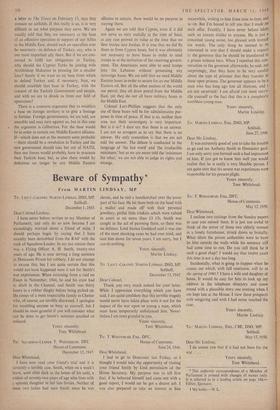Beware of Sympathy*
From MARTIN
LINDSAY, MP To : LIEUT.-COLONEL MARTIN LINDSAY, DSO, MP.
Solihull.
December 1, 1945.
Dear Colonel Lindsay, I have never before written to my Member of Parliament, and only do so now because I am exceedingly worried about a friend of mine. I should perhaps begin by saying that I have recently been demobbed from the RAF with the rank of Squadron-Leader. In my last station there was a Flying Officer A. H. Smith, twenty-two years of age. He is now serving a long sentence in Doncaster Prison for robbery. I do not attempt to excuse this, but I am quite certain that this would not have happened were it not for Smith's war experiences. When returning from a raid on Essen in November, 1944, he and his crew had to ditch in the Channel, and Smith was thirty hours in a rubber dinghy before being picked up. He conies of a most respectable family in Chester who, of course; are terribly distressed. I apologise for troubling anyone so busy as yourself, but I should be most grateful if you will consider what can be done to get Smith's sentence quashed or reduced.
Yours sincerely, Tom Whitehead.
TO: SQUADRON-LEADER T. WHITEHEAD, DFC. House of Commons. December 12, 1945. Dear Whitehead, I have now read your friend's trial and it is certainly a terrible case. Smith, when on a week's leave, went after dark to the house of his aunt, a widow of seventy-two years of age who lives with a spinster daughter in her late forties. Neither of these two ladies had seen Smith since he was eleven, and he tied a handkerchief over the lower part of his face. He hit them both on the head with a mallet and made oft' with their personal jewellery, pitiful little trinkets which were valued in court at no more than £3 15s. Smith was caught in the act of pawning them, so there was no defence. Lord Justice Goddard said it was one of the most shocking cases he had ever tried, and sent him down for seven years. I am sorry, but I can do nothing.
Yours sincerely, Martin Lindsay.
To: LIEUT.-COLONEL MARTIN LINDSAY, DSO, MP. Solihull. December 13, 1945. Dear Colonel, Thank you very much indeed for your letter. While I appreciate everything which you have said, I am quite confident that this terrible tragedy would never have taken place were it not for the impact of the war upon so young a man, which must have temporarily unbalanced him. Never- theless I am most grateful to you.
Yours sincerely, Tom Whitehead.
To: T. WHITEHEAD, ESQ., DFC.
House of Commons.
June 24, 1946.
Dear Whitehead, I had to go to Doncaster last Friday, so I thought 1 would take the opportunity of visiting your friend Smith by kind permission of the Home Secretary. My purpose was to tell him that, if he behaved himself and came out with a good report, I would see he got a decent job. I was also prepared to take an interest in him meanwhile, writing to him from time to time, and so on. But I'm bound to tell you that I made no such offer. Frankly, I have never before taken such an instant dislike to anyone. He is just a conceited young swine, too pleased with himself for words. The only thing he seemed to be interested in was that I should make a request to the governor that he should be transferred to a prison without bars. When I reported this con- versation to the governor afterwards, he said, not .surprisingly, that they have to be very careful about the type of prisoner that they transfer to these open prisons. The governor appears to be a man who has long ago lost all illusions, and I am not surprised! I am afraid you must recol- dle yourself to the fact that this is a completelV worthless young man.
Yours sincerely, Martin Linds'a y.
To: MARTIN LINDSAY, ESQ., DSO, MP.
Solihull.
June 27, 1946.
Dear Mr. Lindsay, It was extremely good of you to take the trouble to go and see Anthony Smith in Doncaster gaol. I am only sorry you formed such a bad impression of him. If you got to know him well you would realise that he is really a very likeable person. I am quite sure that his severe war experiences were responsible for his present plight.
Yours sincerely, Tom Whitehead.
To : T. WHITEHEAD, Eso., DFC House of Commons.
May 12,1950.
Dear Whitehead, I enclose two cuttings from the Sunday papers in case you missed them. It is just too awful to think of the terror of those two elderly women in a lonely farmhouse, struck down so brutally. What idiots the prison authorities were to have let him outside the walls while his sentence still had some time to run. Do you still think he is such a good chap? I would say that twelve years this time is not a day too long.
Incidentally, what is going to happen when he comes out which, with full remission, will be in the spring of 1960.t I have a wife and daughter at home. It would be easy for him to look up my address in the telephone directory and cone round with a plausible story one evening when I am kept late at the House. I view these prospects with misgiving and wish I had never touched the case.
Yours sincerely, Martin Lindsay.
To : MARTIN LINDSAY, ESQ., CBE, DSO, MP.
Solihull.
May 15, 1950.
Dear Mr. Lindsay, I do assure you that if it had not been for the war . . .
Yours sincerely, Tom Whitehead.
* This authentic correspondence of a Member of Parliament is printed with changes of names only. It is referred to in a leading article on page 340.— Editor, Spectator.
t My italics.—M. L.










































 Previous page
Previous page